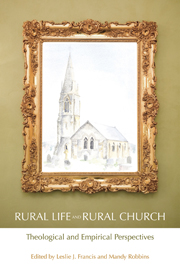Book contents
- Frontmatter
- Contents
- Preface
- Foreword by The Bishop of Shrewsbury, The Rt Revd Mark Rylands
- 1 Introduction: shaping rural theology
- PART 1 PERSPECTIVES FROM THE BIBLE
- 2 Israelite wisdom and pastoral theology in the rural church
- 3 The invisible countryside of the New Testament
- 4 Sheep and goats: pastoral imagery in the Bible and today
- PART 2 PERSPECTIVES FROM ORDINARY THEOLOGY
- PART 3 THEOLOGICAL AND SOCIOLOGICAL PERSPECTIVES
- PART 4 HISTORICAL PERSPECTIVES
- PART 5 LISTENING TO VISITORS
- PART 6 LISTENING TO THE COMMUNITY
- PART 7 LISTENING TO CHURCHGOERS
- PART 8 LISTENING TO CHURCH LEADERS
- PART 9 SATISFACTION AND STRESS IN MINISTRY
- Contributors
- Sources
- Subject Index
- Name Index
3 - The invisible countryside of the New Testament
from PART 1 - PERSPECTIVES FROM THE BIBLE
- Frontmatter
- Contents
- Preface
- Foreword by The Bishop of Shrewsbury, The Rt Revd Mark Rylands
- 1 Introduction: shaping rural theology
- PART 1 PERSPECTIVES FROM THE BIBLE
- 2 Israelite wisdom and pastoral theology in the rural church
- 3 The invisible countryside of the New Testament
- 4 Sheep and goats: pastoral imagery in the Bible and today
- PART 2 PERSPECTIVES FROM ORDINARY THEOLOGY
- PART 3 THEOLOGICAL AND SOCIOLOGICAL PERSPECTIVES
- PART 4 HISTORICAL PERSPECTIVES
- PART 5 LISTENING TO VISITORS
- PART 6 LISTENING TO THE COMMUNITY
- PART 7 LISTENING TO CHURCHGOERS
- PART 8 LISTENING TO CHURCH LEADERS
- PART 9 SATISFACTION AND STRESS IN MINISTRY
- Contributors
- Sources
- Subject Index
- Name Index
Summary
Abstract – There is a clear contrast in the New Testament between the treatment of the countryside in Paul (for whom rural concerns emerge only as the source for occasional metaphors) and the Synoptic gospels (in which agrarian life is portrayed unselfconsciously but in sympathetic detail). This article explores rural imagery and the depiction of the countryside in the Synoptics. This article also seeks to explain the process by which the countryside became invisible to Paul by observing the shift from the mainly rural context of Jesus' first followers to the urban context of Paul's mission. It notes the significance of Luke's transition from a Synoptic to a Pauline perspective between the gospel and Acts. It reflects on issues of urban power and rural powerlessness in the first and twenty-first centuries.
What about the countryside, Paul?
Five times I received at the hands of the Jews the forty lashes less one. Three times I was beaten with rods. Once I was stoned. Three times I was shipwrecked; a night and a day I was adrift at sea; on frequent journeys, in danger from rivers, danger from robbers, danger from my own people, danger from Gentiles, danger in the city, danger in the wilderness, danger at sea, danger from false brothers (2 Corinthians 11:24-26, ESV).
For the benefit of his wayward friends in Corinth, Paul surveyed in 2 Corinthians all the things which had caused him distress or which had brought him shame in his work as a servant of Christ. It led him to write of dangers from human beings and of perils within the natural world.
- Type
- Chapter
- Information
- Rural Life and Rural ChurchTheological and Empirical Perspectives, pp. 22 - 32Publisher: Acumen PublishingPrint publication year: 2012



